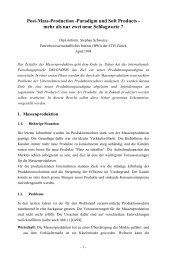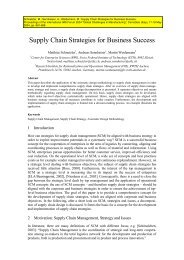The China Venture
The China Venture
The China Venture
Create successful ePaper yourself
Turn your PDF publications into a flip-book with our unique Google optimized e-Paper software.
Chinese partners. He also began to realise why he could not seem to make any headway with<br />
his Chinese partners once Mr. Zheng is gone. Without extra “technology service” which Mr.<br />
Zheng is providing, the strategic partnership may not be too attractive to the Chinese partners.<br />
“Technology service” was never part of the formal agreement to co-operate in the existing<br />
trading arrangements. Similarly, the often necessary inspection and assembly activities<br />
relating to the trading activities were also never specified in any written agreement with<br />
Chinese partners. <strong>The</strong>se anomalies according to Paul’s past perception would now appear to<br />
be central to the business relationships Mr. Zheng had developed and critical to their<br />
maintenance over the longer term.<br />
Paul continued to read on about the cultural factors relating to the negotiations for a Joint<br />
<strong>Venture</strong> in <strong>China</strong>. Brigitta Joho and Jürgen Müller wrote:<br />
3.4 Negotiating for a Joint <strong>Venture</strong>: Strategic Considerations (by Brigitta Joho<br />
and Jürgen Müller)<br />
For many people in the West, <strong>China</strong> is not only geographically but also culturally very far<br />
away. Although modern communication technology gave us a closer link to the Asian world,<br />
this region still seems further away than for example Australia. <strong>The</strong> completely different<br />
culture is one major aspect. It is therefore no wonder that companies use Joint <strong>Venture</strong>s as a<br />
first step to enter the Chinese market. <strong>The</strong> way to a successful Joint <strong>Venture</strong> is long and full of<br />
problems. <strong>The</strong> missing language ability is certainly not the biggest obstacle, but the lack of<br />
intercultural competence, social and economic knowledge and experience.<br />
<strong>The</strong> keys to a successful European–Chinese Joint <strong>Venture</strong> lie in a very good preparation for<br />
the Chinese culture and for any problem which could await the investor, as well as the ability<br />
to use the opportunities provided by an intercultural partnership. This paper tries to highlight<br />
the main differences between German and Swiss values and customs on one side, and Chinese<br />
on the other.<br />
To illustrate these differences we proceed in the following way: In a first step we build the<br />
foundation for our paper, by giving a rough overview about the meaning of culture in its three<br />
different levels and their functions. In the next section we present a more theoretical approach<br />
to the Chinese way of doing business, and in the last part we summarise the experiences<br />
gathered through the inte rviews with different companies. Finally, we would give some<br />
recommendations on how to do business in <strong>China</strong>.<br />
125






